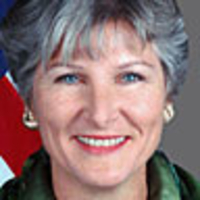After 30 years of violence and bloodshed, it's hard to imagine that the women of Afghanistan fear anything more than ongoing war. Yet in conversations with a diverse group of women ranging from students at Kabul University to small-business owners, it's clear that one nightmare crowds out all others for Afghan women: the fear that the international community will once again abandon them.
As part of the U.S.-Afghan Women's Council, a public-private partnership established by Presidents Bush and Karzai in 2002 to empower Afghan women—we visited Afghanistan a number of times. We saw a barren landscape, cloaked women in burqas, and very limited commerce during our first visit to Kabul in early 2003. We have witnessed incredible changes in the years since. Everything from record numbers of women running for parliament, to women operating their own businesses—employing men and women alike—and women seeking higher education, it's clear that despite challenges, women are making gains in virtually every sector.
That progress was on full display at a conference at the George W. Bush Institute at SMU in Dallas last week, where Afghan entrepreneurs shared stories of developing businesses as diverse as fish farming and rug making. "I want to be an example for all those girls and women who are sitting in their homes and don't think they can come out and work," said Shallah, a young woman who operates a shoemaking business that employs 20 men and women. She participated in a Goldman Sachs sponsored program, 10,000 Women, to train women entrepreneurs. "I can, so they can," she said.

Smart Economics
Developing more women-owned businesses is key to both greater acceptance of women in public life and the economic development and stability of Afghanistan. As Bob Zoellick, president of the World Bank, said, "We've learned that giving women and girls opportunity is more than just the right thing to do. Gender equality is smart economics."
Afghanistan is still one of the poorest countries in the world. Forty-two percent of Afghan citizens live below the poverty line [PDF]. And as women earn income, they earn stature, reminded one of the panelists at the conference. A woman becomes an entrepreneur and makes a rug, and then her husband becomes a salesman, her brother helps keep the books, and she ultimately helps the whole family, building acceptance and creating value for her life.
That spirit of entrepreneurship and desire to be a part of the economy is deep-seated in the women of Afghanistan. When we visited a primary school in the early 2000s, young girls between ages 8-12 already were indicating their strong desire to become business women, government officials, and heads of foundations.
Weary of war, angry about civilian casualties, Afghanistan's women want peace.
But the challenges to doing business in Afghanistan are daunting, and it takes tremendous ingenuity and commitment to get businesses off the ground. At the conference, Johanna Saum from Kate Spade was on hand to talk about her brand's project, in collaboration with Women to Women International, to employ Afghan women and revive the cashmere industry in Afghanistan. But a lack of infrastructure, high illiteracy rates, restrictions on movement, and security concerns create serious roadblocks to foreign companies interested in investing.
Growing Weary
Ten years after the international community went into Afghanistan, tensions are still rising. Weary of war, angry about civilian casualties, Afghanistan's women want peace—yet they want a peace that allows them to preserve and build on the gains they have made. When they hear U.S. and Afghan leaders talk of reconciliation councils or efforts to reach an accommodation with the Taliban, women react with fear and suspicion. And rightly so. After all, it was the brutality of the Taliban that set them back a generation by withholding education, health care and basic human freedom at every step.
"There should be no doubt there will not be any changes allowed by the Afghan people that will diminish or reduce the gains Afghan women have made," President Karzai promised the group in a video appearance.
Afghanistan's women are hopeful but not convinced. And they are counting on the rest of us to make sure that any negotiated peace is a step forward rather than backward for women's full participation in Afghanistan's future.
Creating economic opportunity for women in Afghanistan is a key part of building that lasting peace.
Ambassador Paula J. Dobriansky is senior vice president and global head of government and regulatory affairs at Thomson Reuters. From 2001 to 2009, Ambassador Dobriansky served as undersecretary of state for democracy and global affairs. Ambassador Dobriansky holds a BSFS in international politics from Georgetown University School of Foreign Service and a master's and Ph.D. in Soviet political and military affairs from Harvard University.
Ambassador Karen Hughes is the global vice chair of Burson-Marsteller, where she serves as a senior strategist. Previously, Ambassador Hughes served President George W. Bush as undersecretary of state for public diplomacy and public affairs.






